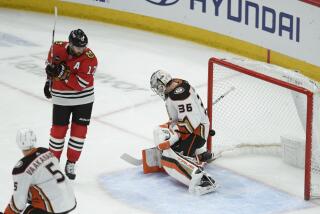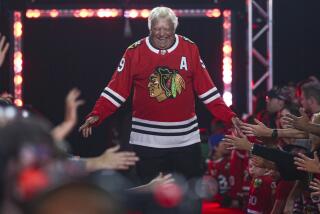Second City revival
- Share via
CHICAGO -- Bob Murray’s name may be on the stationery of the defending Stanley Cup champion Ducks, but the assistant general manager’s heart still beats for a team once revered in this passionate sports city.
The Chicago Blackhawks.
A former defenseman, Murray spent all 15 of his NHL seasons with the team and was in the playoffs for 14 of those. He has watched the franchise lose its way, the club’s storied past of Hull and Mikita and Esposito almost forgotten amid the Bears, Bulls, White Sox and Cubs.
Then he had a shock a few weeks ago in the Windy City, where he still resides.
“I stopped at one of my favorite little joints that has the hockey package to have a cigar and watch us play,” Murray said, referring to the Ducks. “People were coming in and asking if they can get the Blackhawk game on. Are you going to have Blackhawk games? And you hadn’t heard that for years around here.”
The Blackhawks, one of the Original Six, are back, no longer the NHL’s doormat. And there are signs fans aren’t far behind.
As Chicago enters tonight’s game at the Honda Center against the Ducks, its 19-17-3 record has the team in the Western Conference playoff picture. It is a picture the Blackhawks haven’t been part of since 2002, their only postseason appearance in 10 years.
Leading the revival are two 19-year-olds who don’t play like teenagers and a new chairman, the son of an NHL blueblood patriarch who is charting his own course.
“When people this time of the year are talking about hockey, it’s very much out of the ordinary,” agreed Rocky Wirtz, who took over in September after his dad, Bill Wirtz, died at age 77.
They are talking hockey in Chicago, thanks to Patrick Kane and Jonathan Toews, the wunderkind bookend forwards. They are the league’s leading candidates for the Calder Trophy, given to the NHL’s top rookie.
A junior star in the Ontario Hockey League, Kane was the top pick in the June draft -- the first time the Blackhawks had the No. 1 pick. Toews (pronounced TAYVZ), out of the University of North Dakota, was taken third overall in 2006.
“They’re the future of our franchise and I want [people] to know who they are and what they are,” said Denis Savard, the Blackhawks’ Hall of Fame center and now the head coach. “They’re something special.”
The league is noticing.
“They’re very confident players,” Ducks veteran defenseman Mathieu Schneider said. “If you’ve got a couple of guys with skill like that and you’ve got a coach that lets them play and lets them make mistakes and grow and learn, they’re just going to get better and better.”
That is Savard’s plan.
“The biggest thing is you can’t be afraid of success,” he said. “You establish something that’s good, it’s going to get harder.”
Kane and Toews know that.
“Savy keeps saying there’s a buzz in this city but we’ve got to prove that it’s not just a fling,” said Toews, who has 15 goals and 32 points. “It’s the real thing.”
Kane, who has nine goals and 38 points, takes it all in stride.
“I think we’re just two young kids,” he said. “We don’t really know any better. We just want to come in here and play hockey, trying to help the team win games, whatever way that is.”
Like any young team, the Blackhawks have growing pains. An example is Tuesday night’s 9-2 loss to the Kings, Chicago’s worst defeat of the season.
Even more painful, Toews sprained his knee in the loss and will be out for four weeks.
The Blackhawks don’t want to be without either rookie.
“They are both different kids but they have the right attitude,” Blackhawks veteran forward Robert Lang said. “They’re willing to learn and get better. But these kids, they are just full of energy. It’s nice to be around that. It kind of rejuvenates you.”
NHL scouts knew about Kane’s ability, displayed prominently last season in the OHL when he had 62 goals and 145 points. The Buffalo native also works the corners and plays in front of the net despite being only 5 feet 10 and 163 pounds.
“One thing everybody talked about is his toughness,” Chicago General Manager Dale Tallon said. “He went into the tall trees and came out with the puck. He’s not a perimeter player.”
Toews can be a dazzling performer. His goal against Colorado on Oct. 19 in which he cut through the entire defense with several show-stopping moves has been viewed nearly half a million times on YouTube.
But it’s the Winnipeg native’s maturity that has most impressed those within the organization. An example of that came when he addressed the team after a loss to Florida in a swoon in which the Blackhawks lost six of seven. Toews said the team “didn’t hate to lose enough.”
Losses notwithstanding, Chicago has gone from a plodding team of overpriced free agents to a creative squad in the image of Savard, an offensive wizard who scored 1,338 points.
The resurgence hasn’t yet translated to the turnstiles. Through the first 21 home games the team averaged 14,584 fans in the 20,500-seat United Center, ranking them 25th out of 30 teams. That is well up, however, from the last three seasons: 13,253 (2003-04), 13,319 (2005-06) and 12,757 (2006-07).
And Sunday night’s game against the visiting Kings was the second straight sellout.
Blackhawks spokesman Jim DeMaria said the walk-up sales are among the highest in the league. Though the club didn’t provide specific numbers on season-ticket sales, the figure is reportedly around 6,200 with the ultimate goal being 10,000.
Still, it’s a far cry from the standing-room-only crowds in old Chicago Stadium.
Perhaps if anyone can turn things around it is Rocky Wirtz, who has managed to reshape the franchise without trampling his dad’s legacy.
The elder Wirtz ran the Blackhawks for 41 years but developed a reputation as a penurious owner, often unwilling to pay the going rate for his top players. He refused to let home games be televised and, at one point, raised ticket prices even as the Blackhawks were floundering.
Routinely referred to as “Dollar Bill,” he was once called by ESPN the worst owner in sports because of his stringent policies.
Rocky Wirtz understood the criticism, but the attacks on his father cut deep.
“It’s something my siblings and I grew up with,” he said. “It comes with the territory when you’re in the public eye. Unfortunately, people get hit around you with the same cannon fodder.”
At the funeral, Bill Wirtz was remembered as one of the most influential people in hockey and for his role in building the privately financed United Center.
“Dad was a strong man,” said the 55-year-old Wirtz. “He was a very principled man and, many times, that principle was something people wouldn’t agree with. But you have to respect him. You knew where he stood.”
As soon as Wirtz took over, it was clear change was coming.
First he reassigned longtime vice president Bob Pulford to a non-hockey position. Many fans saw Pulford as one of the reasons the franchise had fallen so low.
Then Wirtz worked out a deal with Comcast SportsNet to show home games. He understood that such a move would not hurt attendance, as his father had feared. By early December, the proof was in: attendance was up an average of 1,000 a game.
Then last month, he lured John McDonough from the Cubs to become the Blackhawks president. McDonough is considered Chicago’s best sports marketing executive, having made historic Wrigley Field a destination despite the Cubs’ middling success.
“For a whole host of reasons, we offended them,” Wirtz said of the team’s fans. “They were offended and they weren’t going to give the Wirtzes their money.
“I think the fans want to see us succeed. They want us to do well. Just give them a reason to come back.”
Murray agreed, adding: “Hockey needs Chicago. The NHL needs Chicago to be good.”
--
More to Read
Go beyond the scoreboard
Get the latest on L.A.'s teams in the daily Sports Report newsletter.
You may occasionally receive promotional content from the Los Angeles Times.






